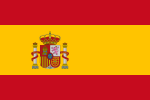
Back الفساد في إسبانيا Arabic Corrupció a Espanya Catalan Corrupción en España Spanish Korruptio Espanjassa Finnish Ispaniyada korrupsiya Uzbek
This article has multiple issues. Please help improve it or discuss these issues on the talk page. (Learn how and when to remove these template messages)
|
| Political corruption |
|---|
 |
| Forms and concepts |
| Anti-corruption |
| Corruption by country |


Political corruption is a large concern in Spain. Political corruption is defined as the action or inaction of one or more real persons managing public resources for their own or a third party's benefit to the detriment of all the citizens they should serve and benefit. Transparency International Global Corruption Barometer 2013 shows that the surveyed households consider political parties, Parliament and the judiciary the most corrupt institutions.[1] In fact, the Spanish population considers corruption their second biggest problem, only eclipsed by unemployment.[2] Following Spain's return to democracy after the end of the Franco dictatorship, the judiciary became an independent branch of government (despite being governed by a council chosen by the legislative branch of government). In the early part of the 21st century this independent judiciary is active in pursuing political corruption.[3][4]
On Transparency International's 2023 Corruption Perceptions Index, Spain scored 60 on a scale from 0 ("highly corrupt") to 100 ("very clean"). When ranked by score, Spain ranked 36th among the 180 countries in the Index, where the country ranked first is perceived to have the most honest public sector. This is much better in comparison to other countries.[5] For comparison with worldwide scores, the best score was 90 (ranked 1), the average score was 43, and the worst score was 11 (ranked 180).[6] For comparison with regional scores, the highest score among Western European and European Union countries [Note 1] was 90, the average score was 65 and the lowest score was 42.[7]
Transparency International also rated Spain between 2001 and 2012 using a different methodology for the Corruption Perceptions Index. The average value for Spain during that period was 66.67 points with a maximum of 70 points in 2001 and minimum of 61 points in 2009 (100 being no corruption).[8] In 2011 it was rated 30th least corrupt country in the world.[9] According to Politico, 1378 officials were prosecuted for corruption between July 2015 and September 2016.[2]
The occurrence of petty corruption is rare in Spain, according to the Global Competitiveness Report of 2015. Bribery is not widespread in business dealings in Spain, yet companies cite corruption as a business impediment. As suggested in the Business Anti-Corruption Portal, anti-corruption strategies should be significantly strengthened at all levels of the government. One example could be to strengthen investigative and prosecution efforts and enforcing existing laws. Corruption in the tax administration is not an obstacle to business (Global Competitiveness Report 2015-2016). Paying taxes has been made less costly by reducing the rates for corporate income, capital gain and environment taxes, and the time required to pay taxes is lower than the OECD countries’ average (DB 2016). Spanish tax regulations represent a moderate challenge for foreign companies.[10]
Among Spain’s police forces, corruption is not widespread and there are only small isolated cases involving police corruption. The police services are considered reliable in protecting companies from crime (Global Competitiveness Report 2015-2016), and the necessary mechanisms are in place to investigate and punish abuse and corruption in the police services. There are isolated reports of police corruption, but these are typically resolved effectively by the authorities (HRR 2014).[11]
- ^ "Global Corruption Barometer 2013". Transparency International. Retrieved 3 December 2013.
- ^ a b "'Country of thieves' wrestles with corruption". POLITICO. 7 March 2018. Retrieved 7 March 2018.
- ^ Dr. George Venturini, Adjunct Professor at the Institute for Social Research at Swinburne University, Melbourne. (25 March 2012). "Corruption In Spain And The Judicial 'Framing' Of Judge Baltasar Garzón Real" (PDF). Counter Currents Organization, India. Retrieved 5 August 2013.
{{cite web}}: CS1 maint: multiple names: authors list (link) - ^ Prof Victor Lapuente (the Quality of Government Institute, University of Gothenburg. "¿Por qué hay tanta corrupción en España ?(Why is there so much corruption in Spain?)" (in Spanish). El País Spain. Retrieved 5 August 2013.[permanent dead link]
- ^ "The ABCs of the CPI: How the Corruption Perceptions Index is calculated". Transparency.org. Retrieved 28 February 2024.
- ^ "Corruption Perceptions Index 2023: Spain". Transparency.org. Retrieved 28 February 2024.
- ^ "CPI 2023 for Western Europe & EU: Rule of law and political integrity threats undermine action against corruption". Transparency.org. Retrieved 28 February 2024.
- ^ "Spain Corruption perceptions - Transparency International - data, chart - TheGlobalEconomy.com". TheGlobalEconomy.com. Retrieved 11 April 2018.
- ^ Corruption in Spain - still a problem Archived 1 June 2019 at the Wayback Machine.
- ^ "Snapshot of the Spain Country Profile". Business Anti-Corruption Portal. Archived from the original on 6 December 2013. Retrieved 3 December 2013.
- ^ "Spain Corruption Report".
Cite error: There are <ref group=Note> tags on this page, but the references will not show without a {{reflist|group=Note}} template (see the help page).
© MMXXIII Rich X Search. We shall prevail. All rights reserved. Rich X Search